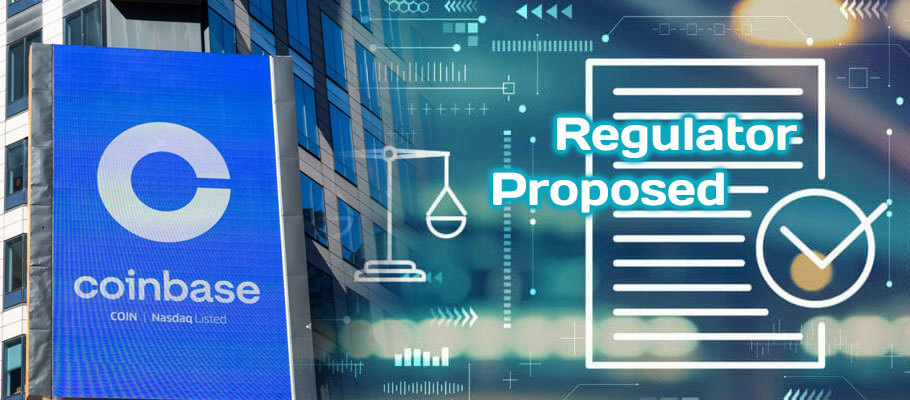
Published: October 18th, 2021
As the last week drew to a close on Friday, US crypto exchange Coinbase published a proposal for a new regulatory regime to oversee cryptocurrency trading. If adopted, it would see America bin the patchwork of federal and state-level rules for the industry with one purpose-built federal agency.
The idea was part of a document titled "Digital Asset Policy Proposal,” with plans for a single regulator forming one of four pillars that the company says should inform the government's approach to crypto oversight.
‘Responsibilities for the new regulator authority would include oversight of a new registration process for digital asset marketplaces and the assurance of appropriate disclosures so that digital asset investors have the disclosure they need to make informed decisions, the document says. It also calls for a self-regulating body recognised by legislation, similar to those found in other sectors.
Coinbase makes its proposal at a time when the crypto industry finds itself being scrutinised as never before by lawmakers in Washington. The growing list of committee hearings and pronouncements has led to frustration by Coinbase and other major industry players at the snail-like place of decision making.
The crypto regulatory process has been characterised by complexity and internecine squabbles, Coinbsse says, as federal agencies like the SEC and CFTC arm-wrestle over who should have jurisdiction amid a flurry of parallel investigations at the state level.
In a briefing with Dow Jones, Coinbase CEO Brian Armstrong described the current patchwork of rules as a holdover from the paper-based era of finance; one that's no longer fit for purpose. The industry needs a new ‘digital native’ body to help American investors access the benefit of blockchain-based financial services. He also suggested that Bitcoin and Ethereum should be largely exempt from regulatory action since they’ve become so decentralised.
Armstrong also said that projects that issue tokens on decentralised exchanges could be beyond the scope of financial regulation. In contrast, the tokens themselves should be subject to oversight if they became trade-able on ‘marketplaces for digital assets,’ a term describing centralised crypto companies, and one that’s important to Coinbase’s own expansion plans for the NFT market (see below).
While Coinbase's call for a streamlined and fully digital regulatory regime will be welcomed by many in the crypto and blockchain industries, the idea is unlikely to catch fire in Washington anytime soon.
Is Coinbase engaged in wishful thinking? Creating a new crypto superagency would need an act of Congress and White House support, a combination that seems unlikely given the gridlock that’s overtaken the US federal government on vital policy issues like the current infrastructure bill. The crypto’s industry’s relatively weak lobbying capability is another factor.
The existing agencies, including the mighty SEC, would also be sure to put up a fight if their jurisdictions are threatened. It also remains to be seen if state governments are happy for the federal government to remove their investor and consumer protection responsibilities where crypto is concerned.
Coinbase's suggestion that the country needs a digital-native regulator has been a consistent message from CEO Armstrong, who isn’t shy about expressing his frustration with Beltway political inertia.
He acknowledges that the company will encounter opposition as it pushes federal lawmakers to embrace its proposal but said it is vital that the country’s leaders design a new crypto regulatory regime rather than trying to govern a 100 per cent digital industry with legal rules designed for a pre-internet world.
Influential venture capital firm Andreessen Horowitz, who has numerous positions in crypto startups, recently launched its own ‘web 3 policy hub,’ which aims to help blockchain companies and regulators forge a shared understanding about the regulatory needs of the fast-evolving crypto economy.
Coinbase’s proposal for one regulator to rule them all comes amid surging interest in the exchange’s soon-to-be-launched NFT marketplace.
Coinbase NFT, the company’s peer-to-peer exchange for non-fungible tokens (NFTs), racked up more than 1.5 million signups just 48 hours after the imminent launch was announced last week.
The exploding NFT marketplace has so far confounded regulators, who are still getting to grips with how to categorise the rapidly expanding array of new digital assets.
Slated to open before the end of the year, Coinbase NFT, the company says, will make the minting, buying, marketing, and discovering NFTs ‘easier than ever.
‘In the same way we helped millions of people buy or gain exposure to bitcoin for the first time, we’re now doing the same for NFTs in a simple and trusted way,’ the company said in a statement.
At the time of writing, the waitlist counter on the company’s website had surpassed 1,427,398.
‘We are capturing loads of sign-ups, so please bear with us while we work out any server issues. Thank you so much for your interest,’ an email from the company says when you register. While it's too soon to say what level of fees the company will realise from the new venture, judging by the level of interest, there is clear potential for Coinbase NFT to become a hugely profitable new enterprise.
Coinbase NFT won’t be alone when it launches. Rarible and OpenSea are already there, responsible for USD 6.78 billion in cumulative trading volume in the third quarter of this year. OpenSea is the dominant player by far, accounting for more than 97 per cent of trading volume, according to figures from CoinGecko.
Numbers from DappRadar, meanwhile, show that OpenSea currently boats a rolling 30-day average of 261,047 active users. In the last month, they’ve rung up a total of 2.47 million transactions worth USD 2.98 billion.
While those are impressive figures for an industry still in early infancy, they're dwarfed by the booming DeFi sector, which recently scaled past USD 215 billion in total value locked (TVL). Given Coinbase’s 68 million-plus user base, the NFT market may be set for drastic change in 2022.